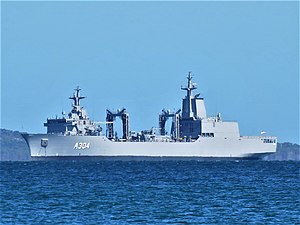Supply-class replenishment oiler
 Stalwart in Cockburn Sound, December 2021
| |
| Class overview | |
|---|---|
| Name | Supply class |
| Builders | Navantia, Ferrol |
| Operators | |
| Preceded by | HMAS Sirius, HMAS Success |
| Cost | |
| Built | 2018–present |
| Planned | 2 |
| Completed | 2 |
| Active | 2 |
| General characteristics | |
| Type | Replenishment oiler |
| Displacement | 19,500 tonnes |
| Length | 173.9 m (570 ft 6 in) |
| Beam | 23.0 m (75 ft 6 in) |
| Draught | 8.0 m (26 ft 3 in) |
| Propulsion |
|
| Speed | 20 knots (37 km/h; 23 mph) |
| Range | 6,000 nmi (11,000 km; 6,900 mi) at 13 knots (24 km/h; 15 mph) |
| Complement | 122 |
| Armament |
|
| Aircraft carried | 1 helicopter |
The Supply class is a class of replenishment oilers of the Royal Australian Navy, a role that combines the missions of a tanker and stores supply ship. As such they are designated auxiliary oiler replenisher (AOR). They are tasked with providing ammunition, fuel, food and other supplies to Royal Australian Navy vessels around the world. There are two ships in the class, Supply and Stalwart.[2] The project is expected to cost anywhere between $1 and $2 billion. Navantia were selected to build a design based on the Spanish Navy's current replenishment vessel Cantabria, which entered service in 2011.[3]
Planning
[edit]
A number of designs were considered by the Australian Government for their replacement tankers, with Navantia competing against the Aegir variant of the Tide-class tanker built by South Korea's DSME in a restricted tender competition.[4][5] Navantia's proposal based on Cantabria was announced as the successful design in the Australian tender in March 2016, with an expected in service date for the first of two vessels of late 2019.[6]
Construction
[edit]The class of ships based on Navantia's replenishment oiler were built at the Navantia shipyard in Ferrol, Spain. The first ship, Supply, arrived at Fleet Base West in October 2020 to begin fitting Australia-specific equipment prior to her service entry in April 2021.[7][8]
The second ship, Stalwart, departed for Australia in May 2021 and arrived in late June.[9][10]
Operational history
[edit]HMAS Supply commissioned at Fleet Base East on 10 April 2021.[11]
HMAS Stalwart commissioned at Fleet Base West on 13 November 2021.[12]
Mechanical defects
[edit]In March 2023, a mechanical defect relating to the shaft alignment was found on HMAS Supply.[13] The ship returned to Garden Island where it was to be repaired by Navantia under warranty.[13]
In June 2024, it was reported that HMAS Supply could remain out of service for another year despite being sidelined for repairs over 14 months ago.[14] In the same month, it was reported that HMAS Stalwart had being sidelined due to mechanical problems relating to its engine.[14][15] As a result, the Royal Australian Navy currently has no operational replenishment oilers as of 2024.[15] The vessels were anticipated to remain out of service until 2025.[16]
Ships
[edit]| Name | Pennant number | Builder | Laid down | Launched | Commissioned | Status |
|---|---|---|---|---|---|---|
| Supply | A195 | Navantia, Ferrol | 18 November 2017 | 24 November 2018 | 10 April 2021 | Active |
| Stalwart | A304 | 25 November 2018 | 30 August 2019 | 13 November 2021[17] | Active |
Gallery
[edit]-
INS Shivalik undergoing replenishment from Stalwart during a Malabar exercise.
Citations
[edit]- ^ Attopardi, Mario (June 2020). "New AORs miss chance to fit next-gen self-defence". Defence Technology Review. No. 68. p. 38. Retrieved 2 May 2021.
- ^ Dominguez, Gabriel (17 November 2017). "Australia names future replenishment vessels". IHS Jane's 360. Archived from the original on 18 November 2017. Retrieved 19 November 2017.
- ^ "Australia selects Navantia for new replenishment ship". IHS Jane's 360. Archived from the original on 13 March 2016. Retrieved 14 March 2016.
- ^ "Minister for Defence – Transcript – Naval shipbuilding announcement, CEA Technologies, Canberra" (Transcript). Department of Defence Ministers. 6 June 2014. Archived from the original on 22 February 2015. Retrieved 1 January 2015.
- ^ Hewett, Jennifer (26 April 2015). "Australian ships, Australian jobs". The Australian Financial Review. Retrieved 4 May 2015.
- ^ Grevatt, Jon (10 March 2016). "Australia selects Navantia for new replenishment ship". IHS Jane's 360. Archived from the original on 13 March 2016. Retrieved 15 March 2016.
- ^ Kuper, Stephen (6 October 2020). "Navy welcomes first of next-generation fleet replenishment, support vessels". defenceconnect.com. Retrieved 2 May 2021.
- ^ McLaughlin, Andrew (6 October 2020). "RAN's new AOR arrives in Australia". ADBR. Retrieved 14 October 2020.
- ^ "NUSHIP Stalwart departs from Spain to join Australia".
- ^ "Supply-class NUSHIP Stalwart to join Royal Australian Navy".
- ^ "HMAS Supply (II)". Royal Australian Navy. Retrieved 2 May 2021.
- ^ HMAS Stalwart Commissioning, retrieved 13 November 2021
- ^ a b Greene, Andrew. "Urgent repairs underway on one of Australia's newest ships after 'potential mechanical defects' discovered". ABC. Retrieved 5 July 2024.
- ^ a b Greene, Andrew. "Australia's newest warship HMAS Stalwart breaks down, undergoing emergency mechanical repairs". ABC. Retrieved 5 July 2024.
- ^ a b Felton, Ben. "HMAS Stalwart sidelined by engine defects". Australian Defence Magazine. Retrieved 5 July 2024.
- ^ "Por problemas técnicos, los buques de abastecimiento construidos por Navantia para la Armada Australiana se encuentran fuera de servicio". Zona Militar. 23 June 2024. Retrieved 3 October 2024.
- ^ "HMAS Stalwart Commissioning". YouTube.

